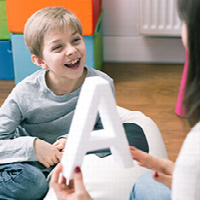Beyond Credentials: Three “Extras” to Look for in Your Child’s Therapist
Has your child recently been diagnosed with Attention-Deficit/Hyperactivity Disorder (AD/HD) or other developmental challenges? Has therapy such as counseling, reading instruction, occupational therapy, or speech therapy been recommended?
If you are looking for a counselor or therapist for your child, you may be wondering how you can tell if that person will be a good “fit” for your child. You, of course, need to make sure the professional has the appropriate degree(s) (bachelor’s, master’s, or PhD depending on discipline), and that they are licensed in the area in which they will be treating your child. Don’t be afraid to ask for their official credentials. Beyond the “official” degrees and requirements, I strongly suggest three additional “credentials” to check out. Unfortunately, these special skills aren’t required to practice, nor are they found on any diplomas or licenses. However, after 30+ years in the therapy trenches as both a professional and parent, I’ve found the following three characteristics to be as important, if not more important, than the clinical skills professionals learn in school. I’ve come to call these my “ACE” credentials:
- Adaptability: You know your child is unique, but does your child’s therapist? Does the therapist treat every child the same, or make it a point to really get to know your child’s likes and dislikes, and the special qualities that make your child unique? If your child is sensitive to noise, will that therapist make sure he or she chooses a quiet environment (at least while initially working on decreasing your child’s noise sensitivity)? Does the therapist know your child is obsessed with monster trucks, and use that theme in his therapy games? If your child does not seem to be interested in the activity planned, is the therapist flexible enough that he or she can adapt the activity to hold your child’s interest while still meeting the activity’s goal? Does the therapist ask you and your child questions to really get to know, and love, your child? Does your child beg to visit his or her therapist?
- Collaboration: Research has confirmed, without a doubt, that everything is connected, and that brain-body issues are closely related to behavioral issues. For example, it is now clear that medical issues, such as allergies, thyroid problems, and digestive woes may all contribute to learning and behavioral challenges. No one discipline has the answer! We all need to work together! Ask your therapist if he or she regularly interacts with professionals in other disciplines to better integrate services. Are there other professionals in the setting where he or she practices? Does he or she regularly consult with other professionals? Were you given a substantial history form to complete, addressing everything from your child’s birth history to academics to medical issues to behavioral issues? If your therapist notices potential problems in areas where he or she is not qualified, do they discuss the concerns with you, and/or refer you and your child to other professionals for further evaluation? Is your therapist eager to read articles you may have found that pertain to your child’s condition and/or treatment, and discuss them with you?
- Empathy: As a parent, and as a patient, I always feel my stress levels go down when I receive services from a real, caring, understanding human being. And when stress levels go down, learning goes up! Studies have shown that empathy, or “validation” of a child’s feelings and thoughts, is one of the most powerful techniques in the therapy arsenal. I can still recall the day one of my students mastered a skill for the first time – we were thrilled! Instead of continuing with the lesson, we celebrated that small victory right there on the spot with whoops, high fives, and a bit of candy from the secretary’s candy drawer! Years later, when I left the clinic, the child’s mother presented me with a plaque she had embroidered with the saying: “Life is not measured by the number of breaths we take, but by the moments that take our breath away.” The plaque is still proudly displayed in my home office. Is your child’s therapist celebrating your child’s milestones? His or her every step forward, no matter how seemingly small it is? Is your therapist communicating to your child that he or she matters, that their ideas and feelings are important, and that their thoughts will always be heard and respected? Does your therapist speak kindly and have heart-to-hearts with your child, as well as with you?
In the last four decades of my career, I have seen incredible improvements in the treatment of children with ADHD and other developmental challenges. The technological advances in computer-based treatments alone are astounding and will continue to improve at an ever-accelerating rate.I have used quite a few of these new treatments in my own practice, and have achieved good results. Nevertheless, I am convinced that real, heart-to-heart human connection is – and always will be – the crucial foundation. So take a little time to get to know your child’s therapist. If you observe the three skills listed above during your child’s sessions, congratulations! Your child’s therapist has “ACE”d his “extra credential” test, and you’re off to a great start!
Author:
Carol Kauffman, M.A./CCC-SLP is a speech-language pathologist with a special interest in helping to integrate speech-language, occupational, educational, mental health, and medical services for children with ADHD and co-existing disorders. She helped implement the Attention-Behavior-Language Evaluation Clinic at Madison County Hospital in London, Ohio and has provided services in early intervention, home health, school, Head Start, and clinical settings. She has also led seminars throughout the country on the topic of service integration for children with “ALPS-plus” challenges. Presently, she writes about topics of interest for parents of children with special needs and is the proud grandmother of Camden, two, and Bennett, eleven months. You can reach her at: ckauffm1@columbus.rr.com.












